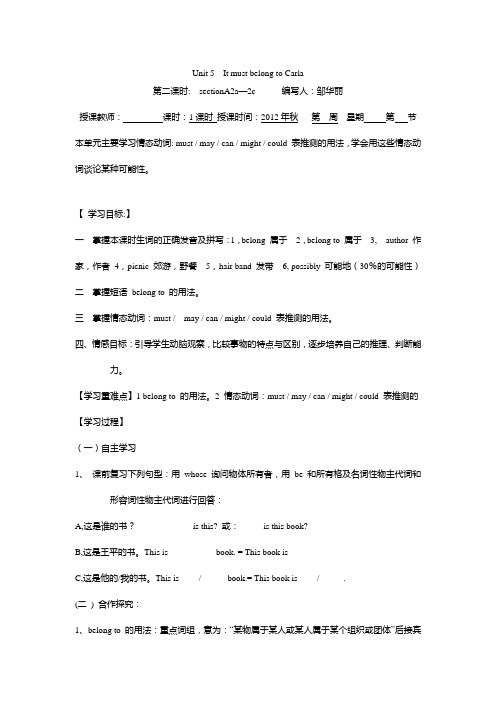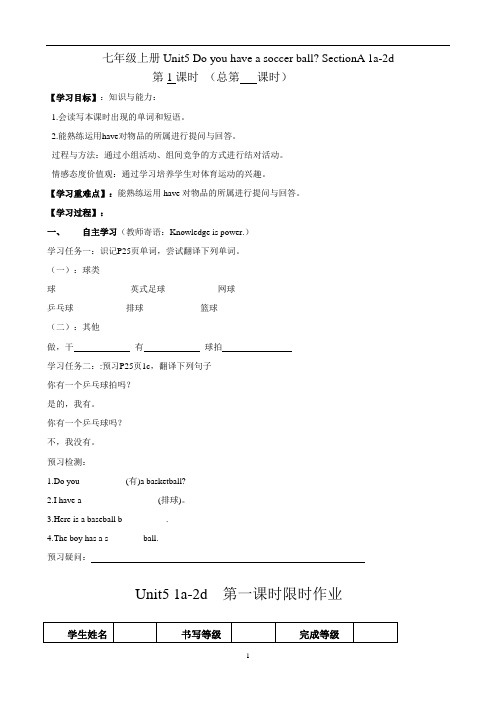七年级上英语unit5导学案(2012秋用)
七 年 级 英 语 导 学 案UNIT5

课题:Unit5 Do you have a soccer ball? Section A 主备教师:孙玉香时间:2012.10.20【学习目标】1.单词及短语:do, does, have , has, tennis , ping pong ball, soccer ball, TV, ping-pong bat, computer game, basketball, let, us, go, play, sound, good, we, late, great , sport.2.掌握动词have的一般疑问句式的构成及其回答。
3.掌握Let’s 开头的句式。
【学习导航】一、预习感知写出球类名词的英文名称并翻译下列动词短语篮球__________ 棒球___________ 排球__________ 足球__________ 乒乓球________网球__________打乒乓球________________ 打篮球________________ 踢足球_________________打棒球___________________打网球_____________________打排球__________________ 参加运动________________二、合作探究1.do的用法①作助动词无意义,翻译下列句子并能用have造出相似的句子.Do you have a basketball? Yes, I do.Do they have a soccer ball? No, they don’tDoes she have a computer? No, she doesn’tDoes he have a ping-pong ball? Yes, he does./No, he doesn’t.句中的do和does都是构成疑问句和否定句的助动词do not的缩写形式_______________ does not的缩写形式_______________don’t/doesn’t+动词原形. 如,I don’t ___________(have) a soccer ball . (我没有足球)He doesn’t ___________(have) a ping-pong ball.(他没有乒乓球)②作实义动词,意为________,它的第三人称单数形式是________ . 如,I do my homework everyday.(我每天做作业) 改为否定句:I ________do my homework every day2. Let’s play volleyball①let’s=let us, let的意思是_______,let+人称代词的宾格,us是_________的宾格②let’s +动词原形,如,Let’s ____________(pla y) soccer.3. play +球类如:打篮球play basketball 打棒球____________ 打乒乓球_____________踢足球_______________ 打排球_______________打羽毛球_________________打扑克_______________ 下象棋_____________进行运动________________4.sound作系动词,意思是听起来,后面接形容词,如,That sounds _______________(有趣的); Thatsounds _______________(无聊的); That sounds ______________(令人愉快的); Thatsounds___________________(困难的);That sounds_______________(轻松的)【学习检测】一.用所给单词的适当形式填空1.I don’t____________(have) a soccer ball. 2,He doesn’t ____________(have) a tennis racket.3.Do you ___________(have) a dictionary?4.Let’s ___________(play) volleyball.5.That______________(sound) good.6.Please call ___________(we) at 495-3935.7.____________(Do) she have a sister? 8.____________(Do)Alan have an eraser?二.翻译下列句子1.你有乒乓球吗?2.他有排球吗?3我爸爸没有电脑。
unit5导学案Microsoft Word 文档

Unit 5 It must belong to Carla第二课时: sectionA2a—2c 编写人:邹华丽授课教师:课时:1课时授课时间:2012年秋第周星期第节本单元主要学习情态动词: must / may / can / might / could 表推测的用法,学会用这些情态动词谈论某种可能性。
【学习目标:】一掌握本课时生词的正确发音及拼写:1,belong 属于2,belong to 属于3, author 作家,作者4,picnic 郊游,野餐5,hair band 发带6, possibly 可能地(30%的可能性)二掌握短语belong to 的用法。
三掌握情态动词:must / may / can / might / could 表推测的用法。
四、情感目标:引导学生动脑观察,比较事物的特点与区别,逐步培养自己的推理、判断能力。
【学习重难点】1 belong to 的用法。
2 情态动词:must / may / can / might / could 表推测的【学习过程】(一)自主学习1、课前复习下列句型:用whose 询问物体所有者,用be 和所有格及名词性物主代词和形容词性物主代词进行回答:A,这是谁的书?_____ ______ is this? 或:_____ is this book?B,这是王平的书。
This is __________ book. = This book is _____________C,这是他的/我的书。
This is ____/ _____ book.= This book is ____/ _____.(二) 合作探究:1、belong to 的用法:重点词组,意为:“某物属于某人或某人属于某个组织或团体”后接宾格。
如:这是我的书。
This book belongs to me.=This book is _____= This is __ book .我是这个游泳俱乐部的成员。
七上人教版Unit5 导学案

人教版Unit5 Do you have a soccer ball ?Section A一.单词及词组1.有_________2.网球__________3.球棒__________4.(英式)足球__________5.排球__________6.篮球__________7.允许__________8.走,去__________9.我们__________ 10.迟到__________ 11.我们(宾格)__________ 12.得到,去取__________ 13.美妙的,伟大的__________ 14.参加__________ 15.听起来好像__________16.打乒乓球______________________ 17.踢足球_________________________二.用be(am ,is ,are)助动词(do ,does)填空。
---Yes ,I________1.---_______you a teacher ?---No, I_______ not.2.---_______you have a volleyball?3._________ his uncle at home today?4. ---_______they watch TV?---Yes ,they do.5. ---___________your brother play sports every day?---No ,he doesn’t.6.I ______ a student(学生),he _______ a teacher ,they ________ doctors(医生).7.---______ Mary have a watch?---Yes , she ______. /No, she _______.8.---______ he your uncle?---Yes, he_____. 9.---How ______ your father?---He _____ fine. 三.句子1.你有足球吗?是的,我有/不,我没有。
人教版七年级英语上册Unit 5导学案

Unit 5 Do you have a soccer ball? 导学案设计人:丁利利课时题目Section B 1a-- 1d Period 3学习目标1、知识目标:掌握四会词interesting ,boring,fun,difficult,relaxing,watch TV.2、技能目标:能够运用good,interesting,relaxing,boring,difficult 等形容词谈论自己喜欢哪些球类运动,不喜欢哪些球类运动及原因3、情感目标:学会在生活中互相询问所爱好的运动,并根据情况发出邀请。
让学生更加热爱体育活动。
重难点学会使用描述性形容词及运用这些词汇谈论运动。
小组学习任务◆任务1:知识回顾,温故而知新。
Let’s chant : (学生快速齐读两遍)I have, you have, they have.She has, he has, Mary has.Do I , do you, do they?Does she, does he, does Mary?I don’t, you don’t, they don’t.She doesn’t, he doesn’t, Mary doesn’t.用do, does, don’t, doesn’t 填空1._______ you have a baseball? Yes I ______. / No, I _______.2. _______ she have a tennis ball? No, she ________.3. Kate and her friend _______ have a dictionary.4. Jim _______ have a brother.5. _______ your sister have a computer?(每组派一个代表板演答案,组间互批,根据成绩给每组相应加1--5分)◆任务2:知识准备:通过预习你能用英语写出下列词汇吗?(1)有趣的,令人感兴趣的___________ (2)轻松的__________(3 ) 有趣的,令人愉快的_________(4) 无聊的,令人生厌的__________ (5)困难的_________ (6)观看(7)看电视(每组派一个代表板演答案,组间互批,根据成绩给每组相应加1--5分)任务3:熟读并熟记单词:3分钟内快速记忆6个词汇,每组派一个代表到黑板前听写,根据成绩相应加分。
新人教七年级英语上册Unit5全单元教案导学案共8页

七年级上册Unit5 Do you have a soccer ball? SectionA 1a-2d第1课时(总第课时)【学习目标】:知识与能力:1.会读写本课时出现的单词和短语。
2.能熟练运用have对物品的所属进行提问与回答。
过程与方法:通过小组活动、组间竞争的方式进行结对活动。
情感态度价值观:通过学习培养学生对体育运动的兴趣。
【学习重难点】:能熟练运用have对物品的所属进行提问与回答。
【学习过程】:一、自主学习(教师寄语:Knowledge is power.)学习任务一:识记P25页单词,尝试翻译下列单词。
(一):球类球_________________英式足球____________网球_______________乒乓球____________排球_____________篮球__________________(二):其他做,干有球拍学习任务二::预习P25页1c,翻译下列句子你有一个乒乓球拍吗?__________________________________________是的,我有。
_____________________________________________你有一个乒乓球吗?____________________________________不,我没有。
_____________________________________________预习检测:1.Do you __________(有)a basketball?2.I have a _________________(排球)。
3.Here is a baseball b__________.4.The boy has a s________ball.预习疑问:·Unit5 1a-2d 第一课时限时作业一、单项选择(2分)( )1.—Do you have a volleyball ? —Yes , ______.A.I am B.it is C.you do D.I do ( )2.I have some ________in my room.A. eraser B. ruler C. balls D. book二、用所给词的适当形式填空(5分)1.Ihave two ping-pong b_______.2.I __________(not have) a volleyball.3.He _________(have ) two soccer balls.4.Where is the ________________(篮球)?It's on the table.5.Do you have a b____________ bat?三、按要求完成句子。
初一七年级上册英语人教版Unit 5 Section A 02 导学案

课题:Unit 5 Do you have a soccer ball?第二课时: Section A (2c—3c)学习目标1.我能熟练掌握本课所出现的新单词和重要句子。
2.我能掌握Grammar Focus中的重点句型。
自主学习(I can because I think I can.我可以因为我相信我可以。
)1你拿你的夹克衫了吗?_____________________2.比尔拿着呢。
______________3我去取它。
________________________________4我想打篮球。
______________5还有你的帽子。
_________________________6你的弟弟艾伦也有一个吗?____________合作探究1、根据2d,分角色练习对话,并记忆背诵。
2、掌握Grammar Focus。
3、根据教材要求,完成3a与3b,并掌握其中的重点句子。
4、根据3c中的对话,对子之间编造对话,而后展示。
拓展延伸(Knowledge is power.)1. late作形容词,意为“__________”。
其反义词为___________,意为“__________”;常用固定搭配:____________表示“……迟到”。
如:I am never late for school.2. Hey, Helen, let’s go! let sb. do sth.,表示“____________”。
let’s是_________的缩写形式,通常用来表示建议、请求或命令。
肯定回答一般用“________________________”;否定回答一般用“____________”。
3. Let’s play .让我们一起玩把!play 是动词,意为____________。
①play+球类名词。
如:play basketball/baseball/volleyball...②play the+乐器如:play the piano/violin4. That sounds good .意思是_____________________。
七年级英语上册Unit5整单元导学案
七年级英语导学案班级:姓名:学习内容:Unit 5 Why do you like pandas?Section A (1a-2d)学习目标:1) 能掌握以下单词:tiger, elephant, panda, lion, koala, giraffe, cute, lazy, smart, beautiful, scary, kind, kind of, Australia, south, Africa, South Africa, pet, leg, cat,sleep2) 能掌握以下句型:①What animals do you/does she/ does he like?②Let’s see the …?③Why do you/does she/ does he want to see …?④Because they are ….2. 能力目标:①To observe and describe animals.②To talk about their preferences③To know the implied meaning of some animalsI.Self--study—学有准备,轻松在课堂(一)重点词汇:老虎______________ 大象______________ 树袋熊______________ 狮子______________ 长颈鹿______________ 整天_____________________(二)找出以下重点句:①—Let’s see the lions.②—Why do you want to see them?.③—He can walk on two legs.(三)听力:听录音,完成1b、2a、2b,并且核对答案。
(四)阅读2d,找出重点内容,用红笔做记号。
1. Why don’t you like her? 你为什么不喜欢她呢?另外,Why don’t you + 动词原形,还是一种提建议的句型。
七上Unit 5导学案
七年级英语(上) Unit 5 Section A (1) 课型:新授课【学习目标】1.如何表达―拥有‖,学会用have对物品的所属进行提问与回答。
2.学会使用do和does引导的否定句,一般疑问句,特殊疑问句. 【自主探究】1. have (实义动词) ―有‖,第三人称单数是_______。
I have a soccer ball._____ ______ _______ a soccer ball? Yes, I ____. No, I ______.变为否定句: I ______ ________ a soccer ball.变特殊疑问句: _______ _______ _______ _______?总结:变为一般疑问句:在句首加助动词,第一人称变为第二人称。
变为否定句:在实义动词前面加______(助动词),动词保持原形。
变特殊疑问句:________ _______ +S.+ have?2. Tom has a baseball.一般疑问句并作肯定和否定回答____ Tom _____ a baseball? Yes, ____ ____. No, ____ ______.变否定句:Tom ______ ______ a baseball.对划线部分提问:_______ ______ Tom _________?总结:变为一般疑问句:在句首加助动词,第一人称变为第二人称。
变为否定句:在实义动词前面加______(助动词),动词保持原形。
变特殊疑问句:________ _______ +S.+ have?注意:句中有some,变否定句和一般疑问句时,换成________.【作业】1. Lucy and Lily have a volleyball.否_______________________________________.一疑_______________________________________?Yes, ____________. / No, _____________.特疑_______________________________________?2. Alan has a basketball.否_______________________________________.一疑_______________________________________?Yes, ____________. / No, _____________.特疑_______________________________________?3.I have a ping-pong ball. (一般疑问句且两种回答)________________________. Yes, __________. No, _________.4. They have a computer. (就划线部分提问) ________________________.5.My uncle has a tennis ball. (一般疑问句且两种回答)__________________________________? Yes, ____________. / No, ___________.6.My sister has a tennis bat. _____________________________?7.______ you _______ (have) English books?8.My father ______________(not have) a computer.七年级英语(上) Unit 5 Section A (2) 课型:新授课【自主探究】1. let 词性_________ 译______________1) let sb. do sth. ―让某人做某事‖sb是宾语,代词用宾格,do表示用动词的______.2) Let’s是_____ _____的缩写,后面接动词的_______.表示―我们做……吧!‖ 引导_____句,用于提出建议或征求别人的意见。
人教版新目标七年级英语上册 Unint 5 导学案
人教版新目标七年级英语上册Unit 5 导学案课题:Unit 5 A1 课型:New 课时数:2课时班级: 姓名:【教学目标】Talk about ownership【德育目标】Understanding the cultural differences of China and the West.【重点难点】Learn to use do and does【教学过程】二次备课预习指导:I. 默写下列单词1.做______(三单) _______2.有_______(三单) _______3.网球________4.球______5.乒乓球_____________6.球拍_______7.足球________ _____8.排球_________ 9.篮球__________ 10.让______ 11.(宾格)我们______12.让我们______ 13.去;走______ 14.我们________ 15.迟到_______16.去取______ 17.美妙的________ 18.玩耍_______ 19.听起来好像_________II. 预习并写出下列短语1.一个网球拍___________________2.两个乒乓球拍_________________________3.三个英式足球_________________________4.打排球______________________5.打篮球______________________6.四个棒球球拍___________________________当堂训练:I. 用助动词填空1. _______ you have a soccer ball, Peter? Yes, I ________.No, I __________.2. ________ your brother Alan have one. Yes, he _______.No, he _________.II. 句型转换1. I have a soccer ball. (改为一般疑问句)______________________________________________ ?2. Does your father have a computer? (作否定回答)_______________________________________.3. Does she have a tennis ball? (作肯定回答) 二次备课______________________________________.III. 翻译句子1.你有一个篮球吗?是的,我有。
七年级英语上册导学案Unit5_When_was_he_born(Section_B_)
2012-2013上学年初二英语学案第八周第一课时课型:新授课题Unit5 When was he born?(Section B ) 编制人:审核人:学习目标:通过阅读3a文章,让每位同学仿写自己的小传记。
能力目标:能用有关的形容词来描述人,并能用一般过去式来谈论熟知的,敬佩的人物。
情感目标:让学生学会合作交流,形成正确的人生观和世界观课前延伸:预习课本Section B,找出下列词组和句子。
(1)对某人友好_____ (2) 因……而著名_____(3)作为……而著名(4)一位慈爱的祖父(5)和他的孙子一起度过他所有的闲暇时间_______________ ________ (6)一位著名的小提琴手______________ (7)开始滑冰(8)看过她演奏(9)看见某人做过某事(10)看见某人在某事(11)成为一名滑冰冠军(12)游览美国(13)一位著名的中国钢琴家(14)哼唱歌曲和有难度的乐曲(15)开始学手风琴(16)在四岁时(17)开始学钢琴(18)参加(19)第14届肖邦国际钢琴比赛(20)获得他所在参赛组的一等奖(21)第一位获得此奖的中国钢琴家(22)在70年历史的比赛中(23)第一个做某事(24)活着的(25)出名自主学习:掌握下列知识点1、be fiendly/ kind to sb. 意为例句:2、be famous for. 意为; be famous as. 意为Lu Xun was famous ______ a great writer. Lu Xun was famous ______ his article3、see sb. do sth. / .see sb. doing sth.I often saw him ________(read) books in the classroom.I saw him ________(read) books in the classroom just now.4、Nieer is a well-known Chinese musician.5、two pieces of music、be the first one to do sth.He is always the first /third/last one to get to school.He was the third one to reach the top of the mountain.2、“数词-名词(单)-adj.”结构作定语 a 4-year-old boy ; a three – meter – tall tree He is ___________ this year. A. 14 years old B. 14-year-old 反馈点拨:alive意为―活着的‖,―在世的‖,用作定语时,应将其放在被修饰的名词后面。
- 1、下载文档前请自行甄别文档内容的完整性,平台不提供额外的编辑、内容补充、找答案等附加服务。
- 2、"仅部分预览"的文档,不可在线预览部分如存在完整性等问题,可反馈申请退款(可完整预览的文档不适用该条件!)。
- 3、如文档侵犯您的权益,请联系客服反馈,我们会尽快为您处理(人工客服工作时间:9:00-18:30)。
Unit5 Do you have a soccer ball SectionA1a---2c (1 课时)班级:姓名:学号:【学习目标】一、Vocabularies:1. Words: have, ball, tennis, volleyball, basketball, pin g-p ong, bat, do/does,2. Phrases: soccer ball, tennis ball, pin g-p ong bat, pin g-p ong ball, baseball bat,二、M ain sentences:1. --Do you /they have a TV? -- Yes, I / they do. /No, I / they don't.2. --Does he /she have a soccer ball? --Yes, he/she does. No, he/she doesn ' t.三、学习动词have的一般现在时的用法;使用do和does引导的一般疑问句的构成以及简单回答。
【课前预习】一、预习活动1a,翻译下列词组(每空一词):1. _______________________ 英式足球 _______________2.网球_________________________3.乒乓球拍______________________4. ____________ 棒球拍 _____ ______________5.乒乓球6.有一个排球_________________________二、预习1c和2c,完成下列句子。
1. -- ____ you have a ___________________ (乒乓球拍)? --Yes, I _____ .2. -- ____ you ______ (有)a ping-pong ball? --No, I ________ .3. -- ____ Jane have a _______________ (网球)?--Yes, ______ _______ .4. -- ____ he have a _________ (排球)?--No, _________ _________ .三、预习之后的疑问是_________________________________________________________________【学习过程】一、幻灯片展示引出本节课的新单词,并教读这些单词。
二、M atch the words with the things in the picture. Then check the answers. (Activity 1a)三、L istening tasks and pair work:1. Liste n and circle the words you hear. Write dow n the senten ces you have heard.2. Liste n to the conv ersatio ns and nu mber the pictures. (2a)3. Liste n and match the pictures in 2a with the balls. (2 b)4. pair work:看2b中的物品,利用下面的句型进行对话比赛。
(2c)--Do you /they have a ____ ? --Yes, I / they do. / No, I / they don't.--Does he /she have a ______ ? -- Yes, he/she does. /No, he/she does n't.四、[语法讲解一含有实义动词的一般现在时]1. 变疑问: - _______ you have a soccer ball? --Yes, I _________ . / No, I ________ .-- ____ she/he ____ a tennis racket?她/ 他有一个网球拍吗?--Yes, she/he _______ . / No, she/he _______ .(谓语是实义动词的时候,一般疑问句形式是:do / does提前到_______ 前,主语后面的动词用)2. 变否定:I______________ a soccer ball.我没有一个足球。
She/He _______________ a volleyball.她没有排球。
(谓语是实义动词的时候,否定形式:—3. 总结:1)当主语是第一人称单复数/第二人称单复数/第三人称复数时,在主语加,谓语动词用就变成否定句;在句首加________ ,谓语动词是就变成一般疑问句。
2)________________________________ 当主语是第三人称单数时,在主语加,同时谓语动词用 _____ 就变成否定句;在句首加 ________ ,谓语动词用 __________ 就变成一般疑问句例如:His father has a baseball 否定句是 His father ______________ a baseball.一般疑问句是 ______ his father _______ a baseball?五、 Homework: I.Write down the new words on your excises book. Each words 10 times.2. Complete the tasks 3a-3b on page 27.【课堂练习】一、单项选择:()1. _______ they have a computer? A. Dose B. Do C. Are D. Have ()2. -- _______ he have a pen? --Yes, he _________ . A. Dose; do B. Do; do C. Dose; does D. Do; dose ()3. Do they _________ English books? A. are B. is C. has D. have ()4.Let's__________ the girl find her mother. A. help B. to help C. to have D. have ()5.Dose _________ have a ping-pong bat? A. your sisters B. you C. your brother D. they ()6. I a new En glish book. (A) has (B )have (C) am (D ) is ()7. you have a ping-pong ball? (A)Are (B) Do (C) What (D )How ()8. he a basketball? No, he .(A) do have does (B)does have doesn 't (C) does has don ' t (D) does has doesn 't( )9. We _____ some good baseball bats. (A) are (B) have (C) is ( D ) have is( )10. I have volleyball. Peter _____ a volleyball, too.(A) have (B) does ( C) is ( D) has二、根据要求完成句子。
1.1 have a good pen frie nd.(变为一般疑问句,并作否定回答)______ y ou have a good pen friend ? No, I _________ .2. She has a nice picture.对划线部分提问) ________ dose she _______ ?3. _____ his pare nts _____ (have) a pin g-pa ng ball?(用动词的正确形式填空,并作出相应回答) ——Yes, _______________ .4. _______ our En glish teacher _____ (have) a basketball?(用动词的正确形式填空,并作出相应回答) ------- No, ________________ .5. Do you like playing basketball?(否定回答) ________ , _______________ .Unit 5 Do you have a soccer ball? section A2—4 (2 课时)班级: 学号: 姓名:【学习目标】I .掌握单词 let, play, late, go, sou nd, great, getn .重点句型: We're late. I have my jacket and hat.That's sounds good. 川.掌握提建议的句型Let's--【预习内容】I .预习2d ,根据句意和汉语意思填单词。
1. ________ (咱们)play tennis.3. That (听起来)good.5. _____________ We're (迟到). n .用所给单词的适当形式填空。
1. Let's ________ (be) frien ds.2. He ___________ (have) a soccer ball.2. Can you (打篮球)?4. Let 's _____ (去)to school. 6.Let me _________ (去取)it.3. I think Tom has two _________ (basketball).5. ______ y ou ______ (play) baseball?in .通过预习你的预习疑问是___________________________________________________________ 【学习过程】I .温故知新:I.Have a dictation. 2. Pair work: Show your conversations. n .自主探究:一、Learn the conversation in 2d.1. Read the conversation by themselves and answer the questions.1) Who are they? _______________________________2) Where's the baseball? __________________________3) Does Helen have a baseball bat? _____________________4) Does Helen have a baseball? ________________________2. Read the conversation by groups. Then ask some students to read it.3. Tran slate the senten ces below and lear n some mai n poi nts.㈠We 're late. ________________ [late 的用法]此句中late用作__________ 词,意为___________ 例如:He is always late for school.他总是上学迟到。
